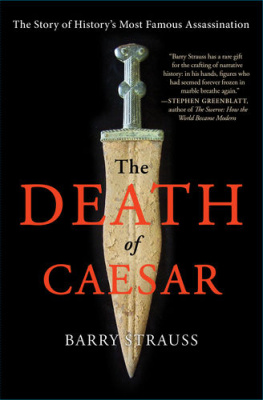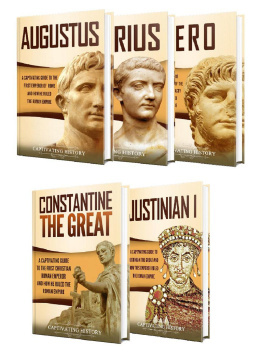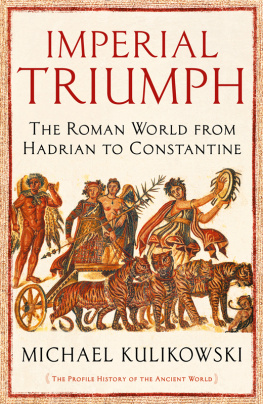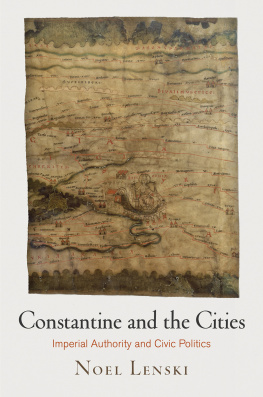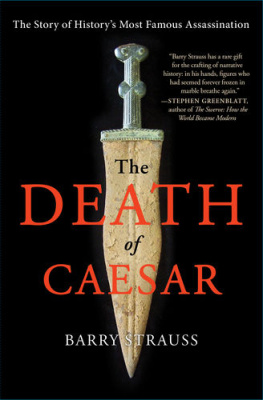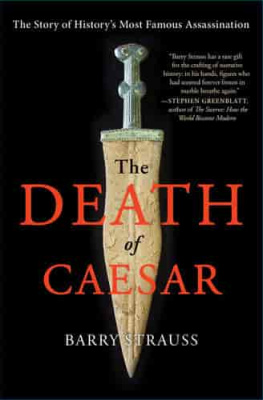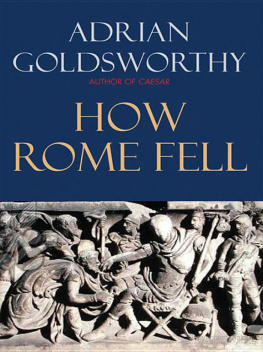CONSTANTINE THE EMPEROR
CONSTANTINE THE EMPEROR

David Potter


Oxford University Press is a department of the University of Oxford.
It furthers the Universitys objective of excellence in research, scholarship,
and education by publishing worldwide.
Oxford New York
Auckland Cape Town Dar es Salaam Hong Kong Karachi
Kuala Lumpur Madrid Melbourne Mexico City Nairobi
New Delhi Shanghai Taipei Toronto
With offices in
Argentina Austria Brazil Chile Czech Republic France Greece
Guatemala Hungary Italy Japan Poland Portugal Singapore
South Korea Switzerland Thailand Turkey Ukraine Vietnam
Oxford is a registered trademark of Oxford University Press
in the UK and certain other countries.
Published in the United States of America by
Oxford University Press
198 Madison Avenue, New York, NY 10016
Oxford University Press 2013
All rights reserved. No part of this publication may be reproduced, stored in a
retrieval system, or transmitted, in any form or by any means, without the prior permission
in writing of Oxford University Press, or as expressly permitted by law,
by license, or under terms agreed with the appropriate reproduction rights organization.
Inquiries concerning reproduction outside the scope of the above should be sent to the
Rights Department, Oxford University Press, at the address above.
You must not circulate this work in any other form
and you must impose this same condition on any acquirer.
Library of Congress Cataloging-in-Publication Data
Potter, D. S. (David Stone), 1957
Constantine the Emperor / David Potter.
p. cm.
Includes bibliographical references and index.
ISBN 9780199755868 (acid-free paper) 1. Constantine I, Emperor of Rome,
d. 337. 2. EmperorsRomeBiography. 3. RomeHistoryConstantine I, the Great,
306-337. 4. Religion and stateRomeHistory. I. Title.
DG315.P68 2012
937.08092dc23
[B]
2012010280
ISBN 9780199755868
1 3 5 7 9 8 6 4 2
Printed in the United States of America
on acid-free paper
CONTENTS
PREFACE
IT IS A PLEASURE to thank those who have played a role in making this book possible. First, that means, as always, my family, both here in Ann Arbor and in Norfolk, Connecticut, where this book began to take shape. Then too my colleagues in the Department of Classical Studies at the University of Michigan, whose congenial and collegial company makes it a pleasure to go to work, and whose willingness to alleviate my ignorance or question my certainty is perpetually engaging. I owe a great debt to the students at Michigan in whose suitably skeptical company I have been exploring the texts that form the basis for this book for many years. Finally, I owe special thanks to Lester Monts, Senior Vice Provost for Academic Affairs at the University of Michigan, whose generous support made it possible to undertake the work in Rome that was crucial to the completion of this book, and to Bill Martin, who has, over the years, shown me what it means to run a large and complex organization without losing sight of crucial values (something of which, I think, Constantine would approve). Pete Oas helped this book take shape on many genial mornings over coffee in the welcoming confines of the Expresso Royale on Plymouth Road in Ann Arbor; Maud Gleason was, as ever, a source of important advice, given her vast command of the intricacies of medical literature; Robert Lister and my colleague Ellen Muehlberger provided guidance in matters of the faith; and Laura McCullagh showed me how to think about Helena. It is also a pleasure to thank Professor Christopher Smith for sharing the hospitality of the British School at Rome, and Professor Greg Woolf for his generous assistance in helping me find my way around. It is also a pleasure to thank Dr. Andrew Meadows of the American Numismatic Society for his help with numismatic material. Harriet Fertig and Jessica Stephens offered a great deal of help at a late stage; the book is better for their careful reading and frank advice. Samantha Lash, Jonathan McLaughlin, and Tiggy Talarico provided a great deal of important help with the final proofs, for which I am also extremely grateful.
Stefan Vranka at Oxford University Press suggested this project to me and has provided excellent advice throughout. Most important, in helping me follow that advice, has been the absolutely fantastic editorial work undertaken by Sue Phillpott. Her efficiency and judgment are outstanding; without her work this book would be very different. I am also very grateful to two leading Constantinian scholars of our time, Hal Drake and Noel Lenski, for sharing their work with me in advance of publication. Molly Morrison has managed the production of this book with impressive efficiency.
Finally, it is a great pleasure to dedicate this book to two very dear friends who have helped me navigate the ancient and modern worlds for the last three decades. This book then is dedicated to Robin Lane Fox and John Matthews.
ABBREVIATIONS
Act. Ab. | Passio sanctorum Dativi, Saturnini presbyteri et aliorum. (Acts of the Abitinean Martyrs) |
Gesta con. Carth. | Gesta Collationis Carthaginiensis cum Donatistis, AD 411 (Acts of the Council of Carthage with the Donatists in 411) |
Amm. | Ammianus Marcellinus, Latin historian, 4th century AD |
Apul. Met. | Apuleius of Madaura, Latin prose writer, 2nd century AD, Metamorphoses, or The Golden Ass |
Aristid. Or. | Aelius Aristides, Greek orator, 2nd century AD, Orations |
Artem. On. | Artemidorus Daldianus, author of a work on dream interpretation, 2nd century AD, Onirocriticus (The Interpretation of Dreams) |
Ath. | Athanasius, bishop of Alexandria, 4th century AD |
Apol. Contra Ar. | Apologia contra Arianos (Defense against the Arians) |
Epist. AD ep. Aeg. | Epistula AD episcopos Aegypti et Libyae |
et Lib. | (Encyclical Letter to the Bishops of Egypt and Libya) |
Hist. Ar. | Historia Arianorum AD Monachos (History of the Arians for the Monks) |
De synod. | De Synodis (Concerning the Councils of the Church) |
Aug. | Augustine of Hippo, bishop and writer, AD 354430 |
Ad Donat. | Ad Donatistas post collationem (Against the Donatist party after the Council) |
Breviculus | Breviculus collationis cum Donatistis (Summary of the Council with the Donatists) |
C. Cresc. | Contra Cresconium (Against Cresconius) |
C. Parm. | |



